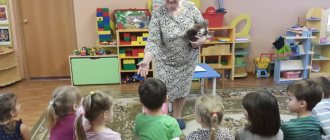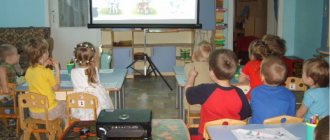Important little things
- If you have chosen the traditional form of a lesson, you should not neglect small effective moves, a highlight that will make your lesson memorable. Some teachers look for interesting aphorisms or parables that smoothly lead the conversation to the topic of the lesson. Remember about visual aids, but it is important not to overdo it in this matter - in this case, students will remember them, and the information you provide will fall on deaf ears.
- It would be a good idea to prepare a booklet in advance for presenting your lesson to the assessors. Firstly, it will be more convenient for them to monitor the progress of your work, and, secondly, this simple trick allows you to win over the commission by showing your respect for their work.
- To conduct an open lesson perfectly, you need the right attitude – yours and the class’s. The commission expects to see a teacher who is calm, confident in himself and his students. Your task is to conduct the lesson as if there were no committee in the room at all. Explain to children that the assessors are not in the classroom to evaluate their knowledge and their presence will not affect their performance in any way.
- Refrain from rehearsing with a class that is planning an open lesson. An experienced eye will always distinguish a rehearsed lesson from the unnatural behavior of children and the teacher. In addition to the negative opinion of the commission about your work, such attempts entail a loss of teacher authority among students. Don't try "too hard." The inspectors will leave, and the children will respect you much less for this suspicious and unnatural zeal.
- Before the end of the lesson, you should sum up, summarize the work of the class, and discuss future plans.
- After the lesson, you will be required to self-reflect on the lesson. It is advisable to prepare it in advance - approximate, of course. This will help you not to be lost in words, to know what you need to start from when evaluating your work.
Choosing a lesson form
The form of the lesson is fertile ground for your imagination. Depending on the type of lesson (presenting new material, monitoring student knowledge, etc.), think about what your students would like. Perhaps they will be happy to travel to the places of life and work of the author being studied, or will they want to take part in an intellectual game? You can invite children to evaluate the work of their classmates (but the teacher should have the final say) or create the conditions for a successful discussion by dividing the class into groups defending different views.
If you decide to try a non-standard lesson format, you need to think carefully about where problems might arise in your plan. Prepare for the unexpected, develop several options in case the lesson does not go according to plan and the students and the committee get bored. When choosing a lesson form, you should focus on a specific class. After all, not all children will accept your rules of the game. And if they don’t want to participate in your experiments, failure is guaranteed. It is advisable to try out innovations in another class before the start of a planned open lesson. This way you can identify weak points in your plan and look at the students’ reactions.
Remember the main stages of the lesson that need to be played out in accordance with the form of the lesson. The Commission usually closely monitors compliance with this condition.
Conducting an open lesson
- Start of the lesson. For any activity, the organizational aspect is very important. It begins with establishing proper order in the classroom and greeting students. Next, you should take a roll call and mark those who are absent.
- In the classic version of the lesson, after this you need to start checking your homework. For an open lesson, an oral survey is preferable, since in this case the “spectators” will be able to find out what material was covered and how the students learned it.
- New material. An open lesson involves actions according to a plan, so in this part it will be necessary to announce to students not only a new topic, but also the goals and objectives of the lesson (in regular lessons this is not always brought to the attention of students). The explanation of new material should demonstrate the teacher's pedagogical skills, his knowledge of scientific information and his ability to communicate with children. You should not turn the explanation of a new topic into a monologue. It is advisable to contact students with questions more often, to maintain their activity and attention.
- Reinforcement of the material can be done through a quick survey. This will allow you to immediately understand how well the students have mastered the topic and what they should pay attention to in the future.
- Ending. At this stage, the results are summed up and homework is given. An important point: children must be released from the lesson with a bell, without being detained.
Analysis of an open lesson
After the lesson, there must be a debriefing. First, a self-analysis of the teacher conducting an open lesson. He voices the extent to which the goals and objectives have been achieved, explains any deviations in the plan, comments on the grades given and the necessary nuances.
This is followed by an analysis of the open lesson by the school administration (head teacher, director), the chairman of the methodological association or the subject methodologist. If time permits, you can have a small discussion with questions and recommendations.
Development of an open lesson
Conducting an open lesson requires more careful preparation from the teacher than daily work. After all, here you need not only to familiarize students with a new topic or consolidate the material covered, but also to demonstrate your pedagogical skills from the best side.
So, in order.
- You need to start by defining for yourself the topic of the open lesson and its purpose, selecting the necessary methodological and scientific aids.
- Depending on the age of the students and the type of lesson, it is necessary to think over a plan for its delivery. This could be a game, multimedia, meta- or cross-curricular activity, etc. The main thing is that the chosen option is interesting, non-standard and must be useful for students to learn the material (i.e. the lesson should not be wasted).
- In parallel with the preparation, it is necessary to discuss and agree with the school administration and the methodological association on the timing of the open lesson in order to include it in the school activities plan and post it for review in the teachers’ room and on the school website. It is also necessary to warn the students with whom the event is planned.
- To improve the quality of the lesson, it is recommended to familiarize yourself with the “Evaluation Sheet”, which can be found at school or on the Internet. This document is usually used by experts to evaluate the work of a teacher participating in a competition or applying for an increase (or confirmation) of a qualification category. But even if an open lesson is planned “for our own people,” these criteria will allow it to be structured methodically correctly.
Main stages of an open lesson
Every teacher knows the main stages of conducting a classic lesson:
- Organizing time.
- Checking homework.
- New material.
- Consolidation.
- Homework.
- Summing up the lesson.
Since conducting any lesson means working with children, whom you need to focus on first of all, in practice, the sequence of stages has to be swapped from time to time or completely depart from the traditional version.
To conduct an open lesson, you will need this plan or several points from it (depending on what type of lesson was chosen).
How to conduct an open lesson correctly
Since an open lesson forces teachers and students to be in a state of heightened emotional and psychological stress, you need to use some tips to help you withstand this test with dignity.
Adviсe:
- Before the lesson, give yourself the mindset that everything will work out;
- be natural in communicating with children, i.e. the way they are used to seeing their teacher;
- do not show your excitement, then the children will work calmly;
- support students during oral questioning and do not criticize them for incorrect assumptions;
- Keep the lesson plan in front of you so that you can refer to it at the right time.



